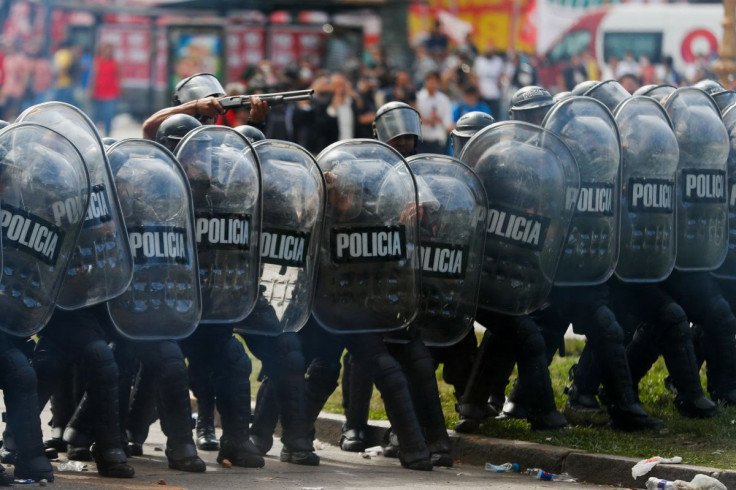Argentines Protest IMF Outside Congress As Lawmakers Debate Deal

Argentines protested outside Congress on Thursday against a $45 billion agreement with the International Monetary Fund (IMF), with most people peacefully holding banners while others hurled stones and smashed windows as police responded.
As lower house lawmakers inside debated the bill, expected to be approved at least partially, thousands of people marched through the streets of the capital, with pockets of violence and some clashes with police carrying shields.
Protesters with drums chanted as others held signs saying "IMF out", "No to the IMF" and "No to the IMF deal", a reference to a staff-level agreement recently struck by the government after over a year of talks which now needs Congress approval.
A few people set fires in the streets, including burning U.S. flags, while others set up giant letters spelling out "IMF" draped in stars and stripes, a reflection of how many people locally see the global lender and Washington, the IMF's largest shareholder, as intertwined.
"It is a colonization agreement, which can only bring more crisis, more adjustment, more poverty," said Romina Del Pl?, a lower house lawmaker for the far-left Workers' Party.
Argentina faces some $18 billion in repayments to the IMF this year which it cannot pay after years of economic crisis, swirling inflation running at 50%, dwindling foreign currency reserves and a weak peso propped up by currency controls.
Officials say the new deal, which replaces a failed $57 billion program struck in 2018, is key to averting default to the IMF. But it comes with economic targets, including reducing the country's fiscal deficit and cutting energy subsidies.
The IMF has a mottled history in the South American grains producing country, where many still blame it for pushing austerity measures that exacerbated a deep economic crisis in 2001-2002 that dragged millions into poverty.
The center-left government, which needs opposition lawmakers support to approve the bill, agreed late on Wednesday to a request by the conservative Together for Change bloc to vote only on the refinancing plan but not the economic targets that would rein in spending.
Presidential spokeswoman Gabriela Cerruti said at a press conference earlier on Thursday that the deal was the "best possible solution to solve the problems that we did not generate but that we have the political responsibility to resolve."
© Copyright Thomson Reuters {{Year}}. All rights reserved.





















